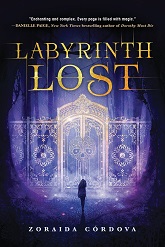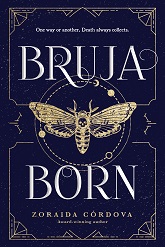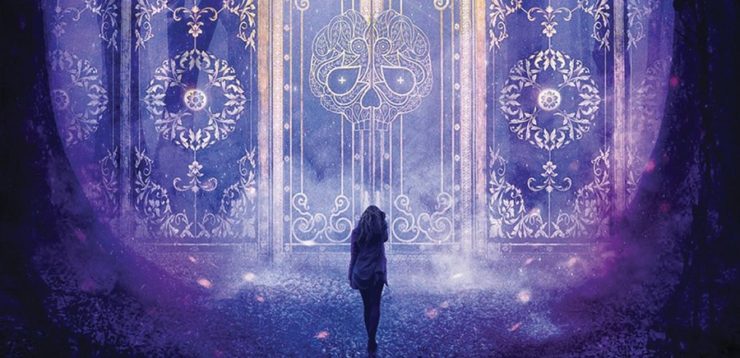Do you love engaging characters, heart-pounding plots, intriguing worldbuilding, and compelling narratives? Are you eager for supernatural suspense with a Latinx twist? Then I’m pleased to introduce you to Labyrinth Lost and Bruja Born, Zoraida Córdova’s firecracker of a young adult fantasy series. Brooklyn Brujas features the three magically-inclined Mortiz sisters, cataclysmic supernatural happenings, and a whole lotta enticing Latinx influence.
The Mortiz sisters come from a family of brujas (witches), but have different powers. Eldest sister Lula is a healer, youngest sister Rose can sense spirits, and middle sister Alejandra is an encantrix. Or, at least she’s supposed to be. When we first meet her in Labyrinth Lost, Alex hates her gift and rejects her destiny. She doesn’t want to be the Chosen One, not for anything in the universe. When she casts a dangerous canto (spell) to circumvent her fate, the backlash traps her family in Los Lagos, a sort of Underworld. With the help of a stubborn and secretive brujo, Nova, and her human BFF Rishi, they descend into Los Lagos. The trio encounter magical beings and come face to face with the Deos, the gods of her people. Alex must make the ultimate sacrifice to save her family.
Buy the Book


Labyrinth Lost (Brooklyn Brujas)
The sequel, Bruja Born, centers on Lula. Post-Los Lagos, Lula’s scars go deeper than those on her face. The whole family—including their long-absent father—is back together in Brooklyn, but the nightmares from her imprisonment still haunt her. So much so that her human boyfriend, Maks, finally breaks up with her. Distraught but apparently having learned nothing from Alex’s mistakes, she casts a canto that defies the Deos, specifically Lady de la Muerte, the goddess of death. Like Alex, her spell backfires, and soon the undead are roaming the streets of New York City. As the corpses piles up, the sisters find themselves the targets of not only the Deos and the living dead, but of supernatural hunters as well. To save the city, themselves, and Lady de la Muerte, Lula must give up that which she loves the most…but can she let go?
I can’t say enough about the worldbuilding in Brooklyn Brujas. In Labyrinth Lost, Córdova delves into the Deos and bruja magic. They practice a kind of magic that demands sacrifice (often of blood) and always comes with recoil (the stronger the canto, the worse the blowback). We see both of those in depth throughout the series, but the foundation is laid in the first. In the sequel we see the larger world beyond cantos and alters. The brujas and brujos of New York City are ruled by a council of elders, but they aren’t the only magical beings in the city. They share it with supernatural beasties galore, not to mention a gang of hunters eager to eradicate them all for the slightest infraction. The three groups have a tenuous ceasefire, and Lula’s actions nearly destroy it. It’s a fascinating premise, and I can’t wait to keep exploring it.
No review of Brooklyn Brujas would be complete without discussing diversity and representation. Córdova infuses her culture into every nook and cranny. The basic story arcs of Labyrinth Lost and Bruja Born have been told a million times over, but the Latinx influence pulls the novels out of their tropes and into something new and unique. This isn’t surface-level diversity. It’s not just the inclusion of Spanish words and names. It’s a way of interpreting the world, of experiencing magic, of making choices. Alex and Lula are rooted in their heritage (Ecuadorian and Puerto Rican) but fully immersed in their present NYC lives.
Buy the Book


Bruja Born (Brooklyn Brujas)
The Mortiz family aren’t just witches, they’re brujas, or in the words of Alex: “All brujas are witches, but not all witches are brujas.” They call upon the Deos, each of whom have a specific role and focus, and honor them with altars and sacrifices. Their ancestors carried the Deos with them from their homelands and continue to practice their ancient traditions. Córdova’s magic/spiritual system somewhat resembles Santería and Candomblé, but it’s not strictly any real religion. What it is is harder to define, but what it isn’t is rooted in Anglo-European traditions. Thank Lady de la Muerte for that. I don’t know about you, but I’m bored to tears with the same old same old. I’ll take a fresh voice from a new cultural perspective over the same tired storyline anyday.
But it’s not just Latinx culture getting a boost here. Alex is bisexual. That’s right, Brooklyn Brujas has a bisexual woman of color protagonist! Forgive my excitement, but young adult SFF isn’t exact awash in main characters who are queer women of color. I can’t even express how wonderful it was to have a bi character who isn’t frustrated with their identity or having to deal with others imposing their bigoted opinions on them. Alex was allowed to be exactly who she is without constraint or fear.
The series features strong, independent young women struggling to find their place in the world. They want things they can’t have, fight like hell for them anyway, then realize they already had everything they needed. The two novels (so far!) are full of adventure and derring-do, but while the plots are fast-paced and captivating, they aren’t frivolous or meaningless. Each carry within them deep undercurrents of hard truths and loss. Neither are for the faint of heart, but they never become gratuitous or obscene. I loved Labyrinth Lost and Bruja Born with all my heart.
Brooklyn Brujas reminded me a lot of Heidi Heilig’s The Girl From Everywhere series and Daniel José Older’s Shadowshaper series. Not in plot—they couldn’t be more different—but in tone and feel. If you loved either of those series, you’re gonna dig Brooklyn Brujas. I cannot recommend Zoraida Córdova highly enough.
Labyrinth Lost and Bruja Born are available from Sourcebooks.
Alex Brown is a YA librarian by day, local historian by night, pop culture critic/reviewer by passion, and QWoC all the time. Keep up with her every move on Twitter, check out her endless barrage of cute rat pics on Instagram, or follow along with her reading adventures on her blog.










